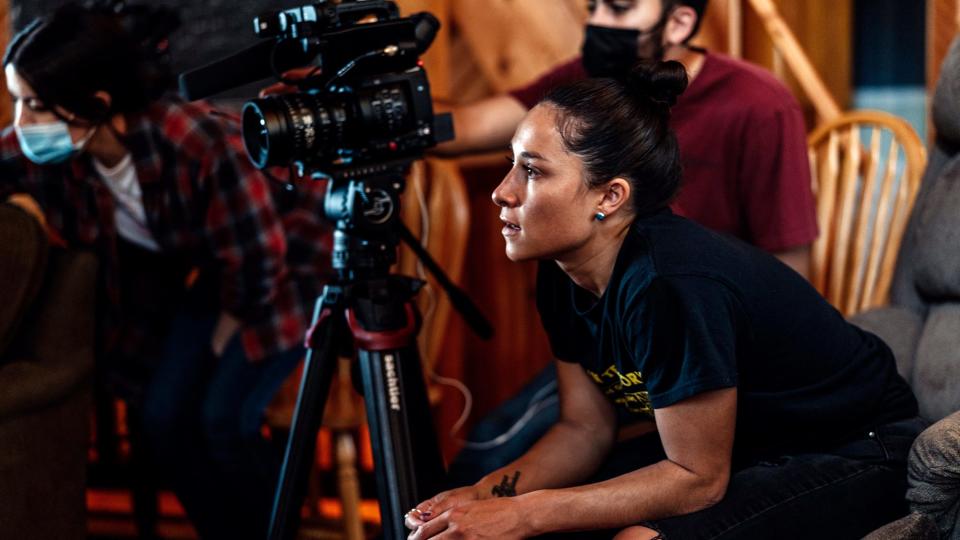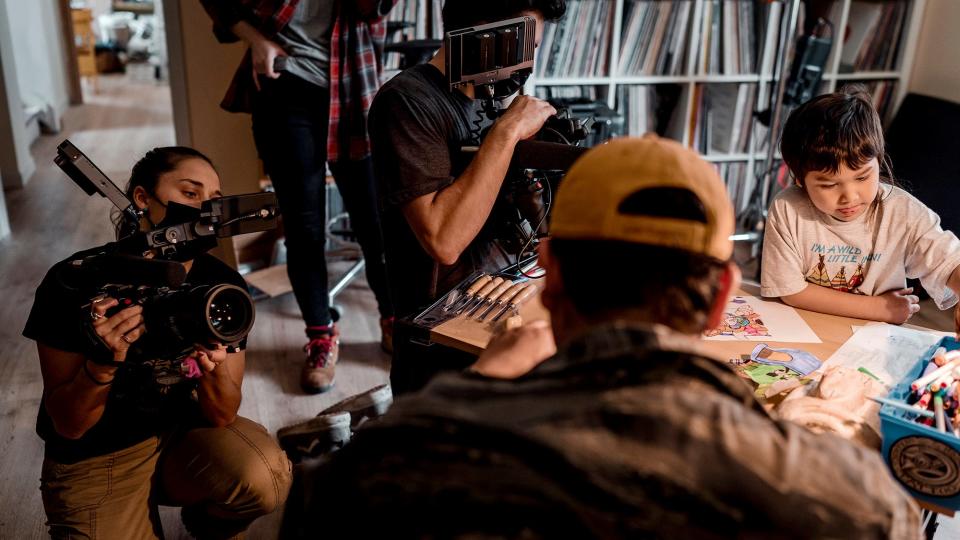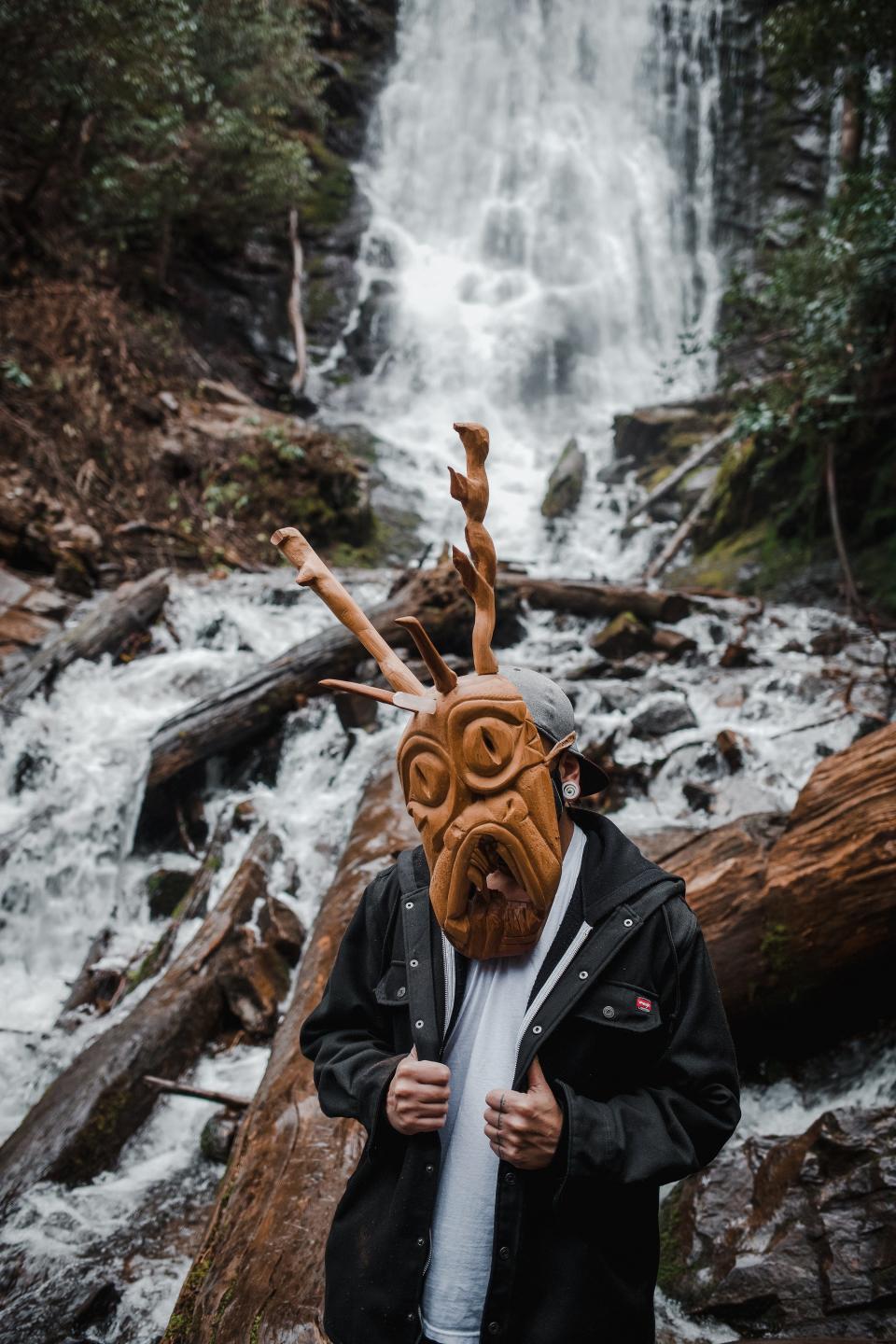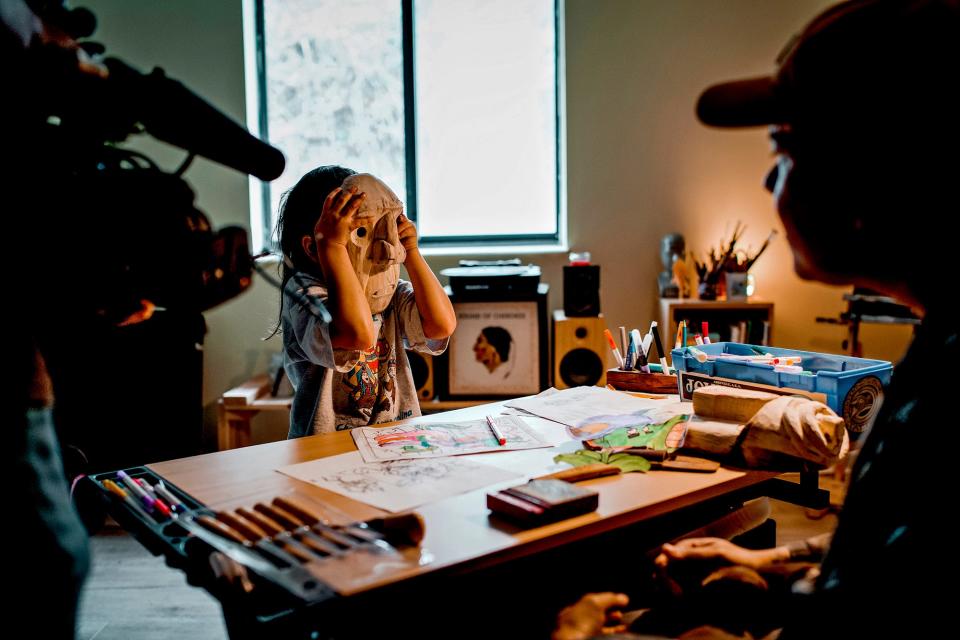Cherokee filmmaker brings Sundance-selected short film home to Oklahoma's deadCenter fest
Brit Hensel's evocative new short film is titled, quite deliberately, "ᎤᏕᏲᏅ (What They've Been Taught)."
"'ᎤᏕᏲᏅ' (or 'Udeyonv') is like the Cherokee word for 'cycle' ... and the whole film felt very cyclical to me. We had different generations of people being taught ... so it felt perfect for what the film was," she told The Oklahoman.
"The language is everything. The language holds our perspective. First-language speakers see the world in a different way than non-Cherokee speakers see it. Our language is so connected to our food, it's connected to the place we come from, it's connected to ceremony, it's connected to traditional medicine. It's connected to everything."

The Cherokee connection to the land also is vital for Hensel, a Cherokee Nation citizen who was born and raised in Colorado but now is based in Tulsa, where she has been building a career in Oklahoma's burgeoning film and television industry.
The filmmaker reached a significant milestone earlier this year when "ᎤᏕᏲᏅ" (pronounced oo-de-yo-NUH) was showcased at the prestigious Sundance Film Festival. According to the Sundance Institute, Hensel is the first woman who is a citizen of Cherokee Nation to direct an official selection at the festival. Since Sundance went virtual this year due to the COVID-19 pandemic, she celebrated her selection with a special screening in January at Tulsa's Circle Cinema.
"I was really excited to have the film at Sundance. ... To be amongst a lot of those directors and creators is pretty awesome. This is my third short film, so I guess I'm still relatively emerging. So, it was quite an honor," Hensel said. "But my heart is to have community be able to come see the film, and it being in Tulsa and being local, a lot of people from our reservations were able to come watch. ... I really, really enjoyed that."
Hensel will get another chance to show her short in Oklahoma during the state's largest film festival, which is marking its own milestones this year. "ᎤᏕᏲᏅ" will be part of a record-breaking slate at the deadCenter Film Festival, set for June 9-12 at various Oklahoma City venues.
"We are making a truly triumphant return to the in-person experience, our first year as an official Oscar-qualifying festival," said Cacky Poarch, interim executive director for deadCenter Film, in an email. "I truly can’t wait to sit in a theater, with the lights out, popcorn in hand, surrounded by the community that built this beautiful beast.”
deadCenter receives record short film submissions
Just a month after the 2021 event, staffers announced that The Academy of Motion Picture Arts and Sciences, the organization that hands out the Oscars, had designated deadCenter a qualifying festival in two Academy Awards categories: Animated Short Film and Live Action Short Film.
This is the first year that deadCenter winners in the Animated Short Film and Live Action Short Film categories will be eligible to enter the Oscars Short Film competition — and the response was stunning, said Sara Thompson, deadCenter Film's director of programming.
This year, deadCenter Film programmers watched a new record of nearly 2,000 submitted films during the first open call for programming since the COVID-19 outbreak. Of those entries, about 1,500 were short films, including more than 1,000 live-action shorts.
"I don't know what I was expecting, because I think that's the world we kind of live in right now: we don't know what to expect," Thompson said. "We killed so many darlings that we just loved, but I already took more than I really have space for. ... So, what's really exciting about it: If a short made it in, it really is the best of the best."

OKC event spotlights Indigenous films
When the full deadCenter 2022 schedule is released May 6, film fans can expect to find about 130 shorts broken up in 15 blocks that the festival's programmers have curated thematically. Although many festivals just group short films randomly, the deadCenter team aims to make the cinematic equivalent of mix-tapes or Spotify playlists.
"It feels really creative and fun. It's feels like you get to find the best spot for each film to really shine," Thompson said. "I did start off (programming) shorts, and I have a really profound love for them. I think it's some of the most exciting content that you get to see because it's the newest, coolest filmmakers coming through."
She pointed out that two acclaimed independent feature films now playing in theaters are directed by moviemakers who showed shorts at the fest: "Everything Everywhere All at Once" helmers The Daniels' "Interesting Ball" was a 2015 deadCenter selection, while "Dual" director Riley Stearns' "The Cub" was included in the 2013 OKC event.
In 2021, deadCenter launched its first cash prize category, for Best Indigenous Short Film, with support from the Cherokee Nation. The 2022 festival will add a Best Indigenous Feature award.
"Being in Oklahoma ... with the Indigenous communities and the 39 tribes (headquartered here), it's just incredibly important to us that we begin to create spaces where those stories can be told," Thompson said.
"Brit Hensel's film is beautiful. ... It is so lovely about giving us a window into this world and explaining to us that viewpoint. ... Especially for Indigenous stories and Indigenous characters — which, unfortunately, Hollywood and the mainstream have gotten wrong so many times — that's so important to us."

Cherokee filmmaker finds opportunities in Oklahoma
When she moved to Oklahoma three years ago, Hensel started out working on "Osiyo, Voices of the Cherokee People," an Emmy-winning documentary TV series that showcases stories of the tribe's history, culture and language.
"I'd made two films before moving (here) and taking that job with the tribe. I just was writing freelance and trying to make a paycheck at being creative. The job with the tribe was sort of the first stable income with creating that I had the opportunity to do," she recalled.
Last year, she seized the chance to work in the camera department on the first season of the trailblazing streaming series "Reservation Dogs." Filmed and set in Oklahoma, "Reservation Dogs" is from Oscar-winning New Zealand filmmaker Taika Waititi, who is of Maori ancestry, and Tulsa moviemaker Sterlin Harjo, who is Seminole and Muscogee.
"Sterlin made space for a lot of Native people who maybe did not have the credentials on paper to work on an FX on Hulu show. We just really got a chance to put our skills to work, and it was one of the most rewarding things I've ever done. I learned a ton. We got to make an awesome show (with) so many Indigenous people," said Hensel, who was getting ready to work on the series' second season, currently filming in northeastern Oklahoma.
"It's really exciting that Oklahoma is becoming sort of this hub."

Acclaimed short explores Cherokee ideas of reciprocity
A 2022 Tulsa Artist Fellow, Hensel filmed "ᎤᏕᏲᏅ in Oklahoma and North Carolina, with a small team of independent artists from both the Cherokee Nation and the Eastern Band of Cherokee Indians. The short is narrated by Thomas Belt, an Eastern Band elder, linguist and Cherokee language speaker, and features artist John Henry Gloyne, who carves traditional wooden masks.
"They're called booger masks, and they have ceremonial and secular places in our society. ... Here, we make those masks with gourds, and the Eastern Band does a lot of booger masks with wood," Hensel said. "I was trying to figure out a way to visually represent balance and knowledge being passed on, and those masks were the thing that I thought about it. There's John Henry's artistry and his wood carving, then he has his sons there, who grow up seeing him do this very old, traditional thing in a modern-day context."
Made with Keli Gonzales, a Cherokee artist from Welling, Hensel's short is part of the first season of the Reciprocity Project, an Indigenous storytelling initiative seeking to "create a paradigm shift that reframes our relationships to the Earth, other living beings and one another." Hensel said the concept of reciprocity — or exchanging things with others for mutual benefit — was hard to define in words in Cherokee.
"I called up Tom Belt and asked him, 'What's our word for reciprocity?' He kind of laughed, like, 'We don't have one.' It's because it's an action for our people," she said. "In its simplest form, it's not taking more than you're given, replacing what you take, pulling your weight in community. Then, eventually, as we got deeper and deeper into it, honestly, it just came down to responsibility and teaching about 'My actions have an effect ... on the greater whole.'"
Since its world premiere as part of Sundance, "ᎤᏕᏲᏅ has been shown at several other film festivals, including the Big Sky Documentary Film Festival in Montana, Full Frame Documentary Film Festival in North Carolina and the ongoing Hot Docs Canadian International Documentary Festival ahead of its deadCenter debut.
"It's probably one of the best experiences that I've had thus far," Hensel said. "We're losing (Cherokee) speakers as we go, and it's something that our identity is completely embedded in that language. As a language learner, I think a lot of people in my generation are realizing, 'This is time for us to take a hold of this and speak in whatever way we can.' ... Cherokee is a hard language, but I want to encourage Cherokee people — people who maybe are not as familiar with the language — that it's still there. It's still vibrant."
DEADCENTER FILM FESTIVAL
When: June 9-12.
Where: Various Oklahoma City venues.
Tickets and information: www.deadCenterFilm.org.
This article originally appeared on Oklahoman: Cherokee filmmaker brings her film to Sundance, Oklahoma's deadCenter

